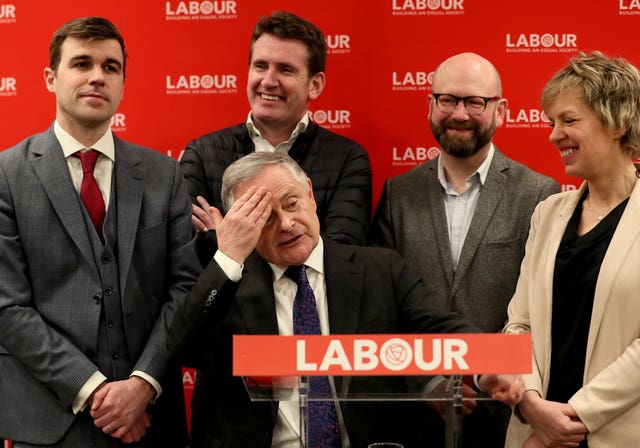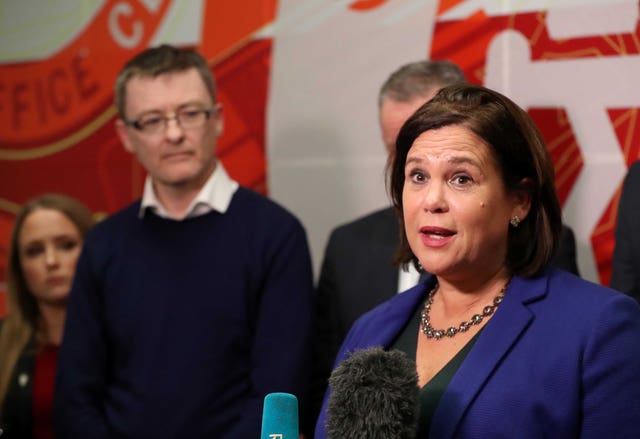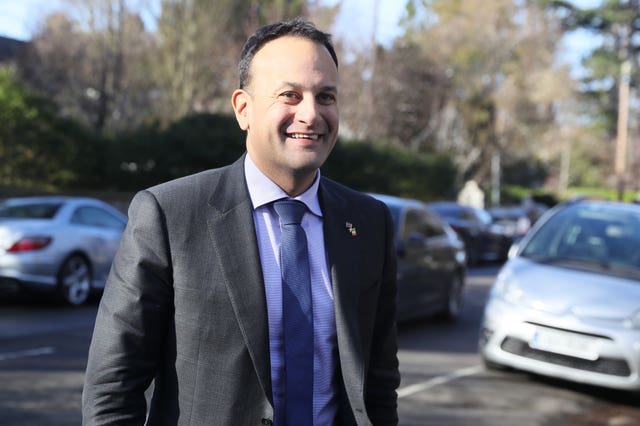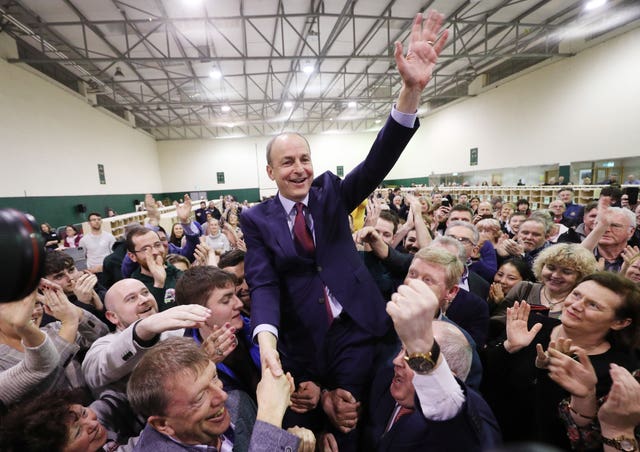
The leader of Ireland’s Labour Party is to quit after a disappointing performance in the General Election.
Announcing his intention to stand down, Brendan Howlin also ruled out Labour entering government, a move that will dint Sinn Fein’s already slim hopes of forming a coalition of left wing parties and independents.
The first major political casualty of the election was confirmed hours after Leo Varadkar said he will likely be the next leader of the opposition.
The prediction from the Fine Gael leader, who remains Taoiseach until a new one is appointed, suggests he believes both Fianna Fail and Sinn Fein will end up in government.
Labour emerged from the election with only six seats, its worst ever result.
The party has shown little sign of reversing a decline in fortunes linked to its time in government as Fine Gael’s junior coalition partner.
Labour’s executive board will meet on Saturday to approve the arrangements for the election of a new leader.
Mr Howlin will remain in place until a successor is found.

“It has been an honour to lead the Labour Party but now is the right time to pass on the baton to a new generation,” said Mr Howlin at a press conference in Dublin.
“It has been undoubtedly a difficult election for us but I believe we have succeeded in sowing the seeds for future growth.”
Mr Howlin’s comments come amid ongoing uncertainty about the make-up of the next government and even if it will be possible to assemble one at all.
Sinn Fein held talks with the leaders of other left wing parties on Wednesday as it tries to assess the viability of leading a government without the involvement of Fianna Fail and Fine Gael.
Labour’s decision not to countenance a return to government, albeit it has offered play a “constructive” role from the opposition benches, has made an already difficult task even tougher.

Even if Sinn Fein secured the support of the Greens, Social Democrats, Solidarity/People Before Profit and a range of independent TDs it still looks like falling short of the 80 seats required for a Dail majority.
Party president Mary Lou McDonald met with Green Party leader Eamon Ryan and People Before Profit representatives Richard Boyd Barrett TD and Gerry Carroll on Wednesday.
She will meet with the Social Democrats on Thursday.
“Sinn Fein wants to form a government of change and our objective is a government that builds homes, cuts rents and freezes them, reduces the pension age to 65, gives workers and families a break, and advances Irish unity,” she said after Wednesday’s talks.
Earlier, Mr Varadkar, who led his party to its second worst election performance in history, said responsibility now lay with Sinn Fein, as the party that attracted the most votes, to seek to put together a “socialist” administration.
However, when asked whether there was any chance Fine Gael could be part of an alternative governing coalition, potentially alongside Fianna Fail, he insisted “anything was possible”.
He said another general election was also a possibility, though he insisted that would not be good for the country.

Mr Varadkar made clear he wanted to continue to lead Fine Gael, even if that was in opposition.
“I think the likelihood, at the end of the process, I will be leader of the opposition and that will require my new parliamentary party still wanting me to do that. I will want to do that,” he said.
After attending the European Financial Forum at Dublin Castle, Mr Varadkar criticised Sinn Fein, claiming the party had made a series of “remarkable promises” to the Irish people, commitments it was now obliged to deliver on.
He also accused the party of promoting a “fake history”, insisting it was Fine Gael that could rightly lay claim to founding the Irish state, not the modern incarnation of Sinn Fein, which he pointed out was established in the 1970s.
“We were defeated in this election and there is no point trying to dress that up in any way,” he said.
He said he had not been involved in any talks with Ms McDonald or with Fianna Fail.
Asked of the prospect of a mooted “super coalition” of Fine Gael, Fianna Fail and potentially the Greens, Mr Varadkar said he would be willing to talk with rival political leaders if there was a need to “give the country political stability”.

If Ms McDonald does not reach 80 seats, she could theoretically form a minority government.
However, that would require an understanding with either Fianna Fail or Fine Gael, through some form of confidence and supply arrangement, that would see them abstain on key votes from the opposition benches.
Solidarity/People Before Profit TD Richard Boyd Barrett said a minority Sinn Fein-led Irish government may not last long but it could still achieve progress on key domestic issues.
“It wouldn’t be sustainable for very long but I still think it’s worth exploring if we could do something to urgently address the housing crisis, some of the problems in the health service with the desperate waiting lists, some of the issues around climate change and the cost of living,” he told RTE Radio One.
Many believe it will be impossible to form a government without the involvement of one of either Fianna Fail or Fine Gael, the two long-time big beasts of Irish politics.
A coalition of Fianna Fail, Sinn Fein and the Green Party, which ended with 12 seats, is seen as a potentially more realistic option.
Though that would involve Fianna Fail leader Micheal Martin u-turning on his pledge never to do business with Sinn Fein.
Another permutation could see the exclusion of Sinn Fein, with Fine Gael and Fianna Fail entering power together with another smaller party or grouping, a so-called “super coalition”.
Fianna Fail could also potentially seek to form a minority government with several of the smaller parties – an administration that would require a confidence and supply deal with Fine Gael on the opposition benches.
That would reverse the landmark pact struck in 2016 that saw Fianna Fail, as the main opposition party, sustain the last Fine Gael-led minority government in power.
With so much uncertainty about the make-up of the next government, another general election cannot be ruled out.
Fianna Fail emerged from Saturday’s election as the largest party by the narrowest margin over the surging Sinn Fein.
The people voted for change and Sinn Féin will do everything that we can to deliver a government for change
There should be no delay in government formation.
We have serious work to do and it needs to begin quickly.@PearseDoherty #GE2020 pic.twitter.com/bMq9WQtPxn
— Sinn Féin (@sinnfeinireland) February 11, 2020
Mr Martin’s party finished with 38 seats to Sinn Fein’s 37 at the end of two days of counting.
But given the Fianna Fail speaker was re-elected without contest, both parties essentially “won” the same number of seats.
Fine Gael was the big loser, winning only 35 seats having entered the campaign as the largest party on 47.
Despite being edged in seat numbers, Sinn Fein was undoubtedly the party with most to celebrate, having smashed Ireland’s long-standing two-party system.
Ms McDonald’s party triumphed in the popular vote and may have won many more seats, potentially an additional 11, if it had fielded more candidates in the landmark contest.
As such, momentum is behind her in taking the first steps in what could be a long and tortuous process to form a new government.
She has predicted she could be Ireland’s next taoiseach.


Comments: Our rules
We want our comments to be a lively and valuable part of our community - a place where readers can debate and engage with the most important local issues. The ability to comment on our stories is a privilege, not a right, however, and that privilege may be withdrawn if it is abused or misused.
Please report any comments that break our rules.
Read the rules here